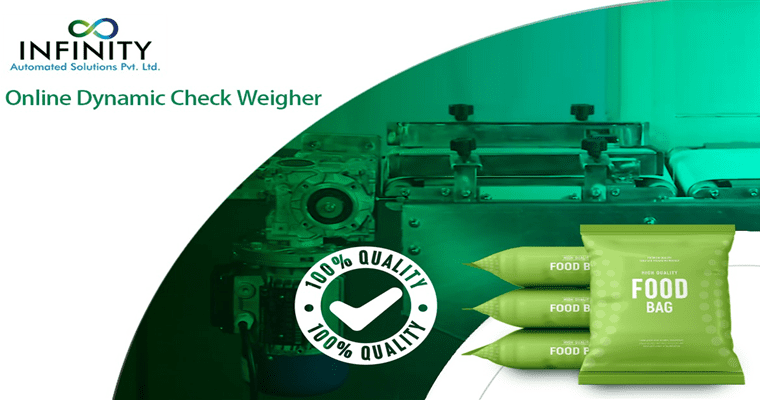Check Weigher Machines: In the dynamic world of manufacturing, precision and efficiency are paramount. Companies are constantly seeking ways to enhance their production processes to meet industry standards, reduce waste, and ensure product quality. One crucial tool that plays a pivotal role in achieving these goals is the check weigher.
What is a Check Weigher?
A check weigher machine is an automated system designed to verify the weight of products during or after the manufacturing process. It acts as a quality control measure, ensuring that each item meets the specified weight criteria. By accurately weighing products, manufacturers can identify and rectify any deviations from the target weight, preventing underfilled or overfilled packages from reaching the market.
Check weigher machines are essential tools in the manufacturing and packaging industries, offering a range of functions and features to ensure accurate and efficient weight control. Here are the key functions and features of check weighers:
1. Accurate Weighing:- Load Cells: Check weighers use load cells or other precision measuring devices to provide accurate and reliable weight measurements.
- Digital Signal Processing: Advanced digital signal processing technologies enhance the accuracy of weight readings.
2. Dynamic Adjustment:
- Auto Calibration: Many check weighers have automatic calibration features, adjusting to variations in environmental conditions and maintaining accuracy over time.
- Product Setup Memory: The ability to store and recall product setup parameters ensures quick adaptation to different products.
3. High-Speed Processing:
- Conveyor Speed Control: Check weighers are designed to operate at high speeds, matching the pace of fast production lines.
- Real-Time Processing: Rapid processing capabilities enable real-time weight checking without causing bottlenecks in the production process.
4. Reject Systems:
- Diverter Mechanisms: When a product falls outside the specified weight range, check weighers activate reject systems, which may include air jets, pushers, or other mechanisms to remove non-compliant items from the production line.
- Soft Reject: Some systems offer a “soft reject” option to divert products gently, minimizing the risk of damage.
5. Data Logging and Reporting:
- Data Storage: Check weighers store production data, allowing manufacturers to track weight variations and trends over time.
- Reporting Tools: Integrated reporting features enable the analysis of data, helping manufacturers make informed decisions about process improvements.
6. User-Friendly Interface:
- Touchscreen Displays: User-friendly interfaces with touchscreen displays simplify operation and configuration.
- Intuitive Software: Check weighers often feature intuitive software that facilitates easy setup and adjustment.
7. Integration with Production Lines:
- Connectivity Options: Check weighers can be integrated into existing production lines and networked with other equipment.
- Compatibility with PLC Systems: Many models are compatible with programmable logic controllers (PLCs) for seamless integration into automated systems.
8. Statistical Process Control (SPC):
- SPC Software: Some check weighers come with SPC software, allowing manufacturers to monitor and control the production process statistically.
- Alarm Systems: Automatic alarms notify operators when weight variations exceed acceptable limits.
9. Size and Weight Range:
- Versatility: Check weighers are available in various sizes and weight capacities to accommodate a wide range of products.
- Compact Designs: Compact models are suitable for limited-space environments.
10. Compliance and Security:
- Compliance with Regulations: Check weighers are designed to meet industry regulations and standards for product weights.
- Password Protection: Security features, such as password protection, ensure that only authorized personnel can access and modify settings.
Check weighers play a crucial role in maintaining product quality, ensuring regulatory compliance, and optimizing production efficiency in diverse industries. The continuous evolution of technology will likely bring even more advanced features to further enhance their performance and usability.
Implementing check weigher machines in manufacturing and packaging processes provides various benefits, contributing to improved efficiency, quality control, and overall operational excellence. Here are key benefits associated with the use of a check weigher machines:
-
Quality Assurance:
- Consistent Product Quality: Check weighers to ensure that products consistently meet the specified weight requirements, preventing underfilled or overfilled packages from reaching consumers.
- Reduced Variability: By minimizing weight variations, check weights contribute to the production of uniform and high-quality products.
-
Regulatory Compliance:
- Meeting Standards: Many industries have strict regulations and standards regarding product weights. Check weighers help manufacturers comply with these regulations, avoiding fines and legal issues.
- Documentation for Audits: The data logging and reporting capabilities of check weighers provide valuable documentation for regulatory audits, demonstrating compliance with weight-related requirements.
-
Cost Reduction:
- Minimized Product Giveaway: Check weighers help prevent the distribution of underweight products, reducing product giveaways and saving on raw material costs.
- Waste Reduction: Early detection of weight variations prevents the production of out-of-spec products, minimizing waste and the need for rework.
-
Operational Efficiency:
- Increased Throughput: The high-speed processing capabilities of check weighers contribute to the efficiency of production lines, allowing for increased throughput.
- Real-Time Monitoring: Check weighers provide real-time monitoring of product weights, enabling prompt adjustments and minimizing downtime.
-
Enhanced Productivity:
- Automated Processes: Check weighers automate the weighing process, reducing the reliance on manual labor and freeing up personnel for more skilled tasks.
- Quick Changeovers: Dynamic adjustment features facilitate quick changeovers between different products, improving overall production flexibility.
-
Brand Protection:
- Maintaining Reputation: Consistently delivering products within the specified weight range enhances the reputation of the brand. Customers trust that they are receiving accurately weighed products.
- Avoiding Recalls: Accurate weight control helps prevent the need for product recalls due to weight-related issues, protecting the brand from reputational damage.
-
Data Analysis for Process Optimization:
- Data-Driven Decision-Making: The data logging and reporting features of check weighers provide valuable insights into production trends and deviations, enabling data-driven decision-making for process optimization.
- Continuous Improvement: Manufacturers can use the collected data to identify areas for improvement, implement changes, and enhance overall production processes.
-
Quick Detection of Anomalies:
- Immediate Rejection of Non-Conforming Products: Check weighers trigger reject systems as soon as a product falls outside the specified weight range, preventing defective items from reaching consumers.
- Minimized Product Recalls: Early detection of anomalies reduces the likelihood of defective products reaching the market, minimizing the risk of costly recalls.
-
Flexibility and Adaptability:
- Dynamic Adjustment: Check weighers with dynamic adjustment capabilities can adapt to changes in product size, weight, or packaging, providing flexibility for diverse production requirements.
- Compatibility with Various Products: Check weigher machines are versatile and can be used for a wide range of products, making them suitable for different manufacturing environments.
-
Customer Satisfaction:
- Consistent Product Experience: Ensuring that products consistently meet weight expectations contributes to a positive customer experience and satisfaction.
- Reliable Quality: Customers trust products from brands that invest in quality control measures, including check weighers.
Check weigher machines find widespread applications across various industries, playing a crucial role in ensuring product quality, compliance with regulations, and operational efficiency. Here are some common applications of check weigher machines:
-
Food and Beverage Industry:
- Packaged Foods: Check weighers are used to verify the weight of packaged foods, ensuring compliance with labeling regulations and providing accurate portion control.
- Bottling Lines: In beverage production, check weighers are employed to confirm the correct fill levels of bottles, cans, or other containers.
-
Pharmaceutical Industry:
- Medication Packaging: Check weighers are critical in pharmaceutical manufacturing to confirm the accurate dosage of medications in individual packages, promoting patient safety and compliance with regulatory standards.
-
Cosmetics and Personal Care:
- Cosmetic Products: Check weigher machines to ensure that cosmetic and personal care products are accurately filled and meet weight specifications, avoiding consumer dissatisfaction and regulatory issues.
-
Chemical Industry:
- Bulk Chemicals: Check weighers are utilized to verify the weight of bulk chemicals and ensure accurate measurements for precise formulation in various industrial processes.
-
Automotive Parts Manufacturing:
- Quality Control: Check weighers are used in the automotive industry to ensure that individual components meet weight specifications, contributing to the overall quality and performance of vehicles.
-
Logistics and Shipping:
- Parcel Weighing: Check weigher machines are employed in logistics and shipping to accurately weigh packages, ensuring that shipping costs are calculated correctly and compliant with carrier weight limits.
-
Retail and E-Commerce:
- Pre-Packaged Goods: Retailers use check weighers to verify the weight of pre-packaged goods, preventing discrepancies between the labeled weight and the actual weight of products on store shelves.
-
Agricultural Products:
- Produce Packaging: Check weigher machines are used in the agricultural sector to ensure accurate packaging of fruits, vegetables, and other produce, meeting both consumer expectations and regulatory standards.
-
Textile Industry:
- Fabric Rolls: In textile manufacturing, check weighers are employed to verify the weight of fabric rolls, ensuring consistency in material usage and meeting customer specifications.
-
Medical Devices:
- Medical Equipment: Check weighers play a role in verifying the weight of medical devices and equipment, contributing to the accuracy of dosage in diagnostic procedures and treatments.
-
Dairy Industry:
- Dairy Products: Check weighers are used in the dairy industry to ensure that containers of milk, yogurt, and other dairy products are accurately filled, meeting both regulatory and consumer standards.
-
Confectionery Industry:
- Packaged Sweets: Check weighers verify the weight of individual packages of candies, chocolates, and other confectionery items, ensuring consistency and compliance with labeling requirements.
-
Electronics Manufacturing:
- Component Weighing: In electronics manufacturing, check weigher machines are employed to ensure the accurate placement of components on circuit boards, contributing to the reliability and functionality of electronic devices.
-
Pet Food Industry:
- Pet Food Packaging: Check weighers to verify the weight of packaged pet food, ensuring that consumers receive the correct amount and that the product complies with regulatory standards.
-
Recycling Facilities:
- Material Sorting: Check weighers can be used in recycling facilities to assist in sorting and weighing materials accurately, optimizing the recycling process.
The versatility of check weigher machines makes them invaluable in industries where precise weight control is essential for quality assurance, compliance, and customer satisfaction. The applications mentioned above highlight the diverse roles that check weighers play in ensuring accurate measurements across various manufacturing and production processes.
Conclusion:
In the ever-evolving landscape of manufacturing, check weigher machines stand out as indispensable tools for maintaining product quality, ensuring compliance with regulations, and optimizing production efficiency. As technology continues to advance, the integration of intelligent check-weighing systems will likely become even more crucial in achieving excellence in manufacturing processes.
Read More: Check Weighers


